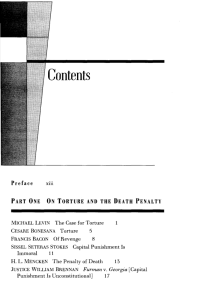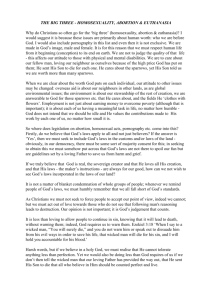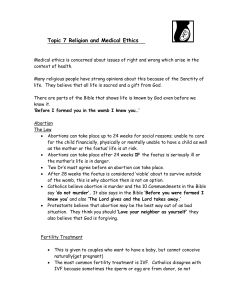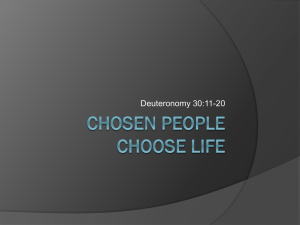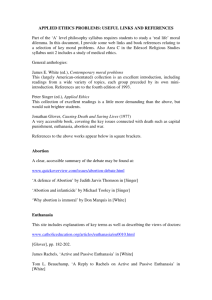Position Papers
advertisement
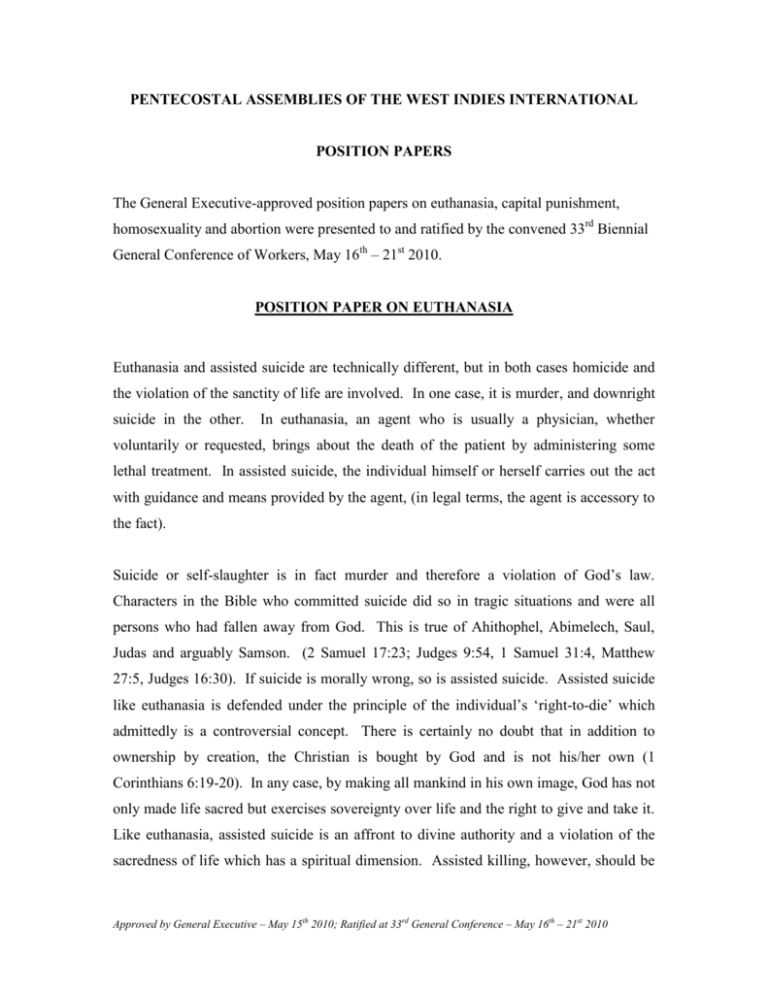
PENTECOSTAL ASSEMBLIES OF THE WEST INDIES INTERNATIONAL POSITION PAPERS The General Executive-approved position papers on euthanasia, capital punishment, homosexuality and abortion were presented to and ratified by the convened 33rd Biennial General Conference of Workers, May 16th – 21st 2010. POSITION PAPER ON EUTHANASIA Euthanasia and assisted suicide are technically different, but in both cases homicide and the violation of the sanctity of life are involved. In one case, it is murder, and downright suicide in the other. In euthanasia, an agent who is usually a physician, whether voluntarily or requested, brings about the death of the patient by administering some lethal treatment. In assisted suicide, the individual himself or herself carries out the act with guidance and means provided by the agent, (in legal terms, the agent is accessory to the fact). Suicide or self-slaughter is in fact murder and therefore a violation of God‟s law. Characters in the Bible who committed suicide did so in tragic situations and were all persons who had fallen away from God. This is true of Ahithophel, Abimelech, Saul, Judas and arguably Samson. (2 Samuel 17:23; Judges 9:54, 1 Samuel 31:4, Matthew 27:5, Judges 16:30). If suicide is morally wrong, so is assisted suicide. Assisted suicide like euthanasia is defended under the principle of the individual‟s „right-to-die‟ which admittedly is a controversial concept. There is certainly no doubt that in addition to ownership by creation, the Christian is bought by God and is not his/her own (1 Corinthians 6:19-20). In any case, by making all mankind in his own image, God has not only made life sacred but exercises sovereignty over life and the right to give and take it. Like euthanasia, assisted suicide is an affront to divine authority and a violation of the sacredness of life which has a spiritual dimension. Assisted killing, however, should be Approved by General Executive – May 15th 2010; Ratified at 33rd General Conference – May 16th – 21st 2010 Position Papers on Euthanasia, Capital Punishment, Homosexuality and Abortion Page 2 of 10 distinguished from the patient‟s decision to refuse treatment which merely sustains life artificially. The right to be allowed to die is in order in that situation. Arguments in favour of euthanasia seem appealing on the surface. Proponents base their case on humane feeling and a supposed basic human right – the right to die. It is directed at terminally ill persons especially those who are in unremitting pain. The term, „terminally ill‟ is problematic since some persons who have been so diagnosed, continue to live long after the physician‟s prediction. Due to the vagueness and uncertainty associated with the concept „terminally ill‟, further qualifying conditions such as suffering severe physical or psychological pain, physical or mental debilitation are added. These vague terms merely leave the helpless and hopeless patients open to abuse. Indeed evidence of abuse has been documented. Euthanasia has been inflicted not only on the diagnosed terminally ill, but on the chronically ill, and those in acute physical and psychological distress. It is even suspected that euthanasia is used as a means of eliminating some infirmed and disabled persons in order to relieve relatives and the State of the burden and cost of healthcare. As Dr. Ndigi Dagbue of the St. Lucia District asserts, this cost-containment matter “would mainly affect the poor who cannot afford private health insurance”. 1 The „right-to-die‟ argument is baseless on both logical and biblical grounds. God who is the giver of life and has appointed our death, and is the only one authorised to take life. (Hebrews 9:27; Ecclesiastes 3:1-2). “Mercy-killing” which is an approval term for euthanasia raises serious ethical principles. This is why it is not universally endorsed and even in countries where it is legalised, the medical profession is divided on the propriety and morality of the act. Based on these considerations, the Pentecostal Assemblies of the West Indies (PAWI) joins with those who condemn euthanasia, and applaud the several Medical Associations whose members predominantly oppose it. In this we are on good and godly grounds. It 1 Article written by Dr. Ndigi Dagbue on ‘Euthanasia’ relative to the development of a position paper on the subject; submitted to the General Executive Constitution Committee, 2006. Approved by General Executive – May 15th 2010; Ratified at 33rd General Conference – May 16th – 21st 2010 Position Papers on Euthanasia, Capital Punishment, Homosexuality and Abortion Page 3 of 10 is contrary to God‟s laws and the laws of many nations for persons to take their own lives or the lives of others. When man arrogates to himself the power to terminate life, he or she usurps the divine authority and comes under condemnation. Euthanasia used as a means of relieving society of its obligation to care for the sick and infirm is a shameful dereliction of duty and a serious moral failure. Instead of euthanasia or assisted suicide, the emphasis should be placed on treatment and care which soothes, and alleviates pain and suffering to the greatest extent in the hopelessly ill. Miracles are still possible and this makes it dangerous to terminate a life before God‟s appointed time. PAWI recognises a difference between removal of artificial life-support and euthanasia. It endorses the position of the National Association of Evangelicals in their 1994 Resolution on the issue: Where patients are terminally ill, death appears imminent and treatment offers no hope of cure, it is morally appropriate to request the withdrawal of (artificial) life support, allowing natural death to occur.2 PAWI reaffirms the sanctity of life, which the Bible as the word of God, upholds. The taking of human life in any form is wrong except in the case of judicial punishment administered by the state and the abortion of a foetus to save the mother‟s life where the mother‟s life is in jeopardy in childbearing. We are not indifferent to human suffering and commend continuing investment in effective modes of palliative care along with Christian-based psychological counselling. To contribute further to patient well-being and the alleviation of suffering we recommend that Christians get involved in: the care of patients who are terminally ill or face an indefinite period of suffering. 2 The National Association of Evangelicals website, www.nae.net – The National Association of Evangelicals (NAE) is fellowship of over 40 denominations and thousands of individual churches, organizations, universities and individuals. Its goal is to unify, serve and represent the evangelical community in the United States. Today it works in four main areas: Church & Faith Partners, Government Affairs, Chaplains Commission, and World Relief. The NAE is a member of the World Evangelical Alliance (WEA). The NAE was founded in 1942. Approved by General Executive – May 15th 2010; Ratified at 33rd General Conference – May 16th – 21st 2010 Position Papers on Euthanasia, Capital Punishment, Homosexuality and Abortion Page 4 of 10 the provision of appropriate spiritual and psycho-social support for those with incurable illnesses. the education of patients on their condition and prospects, and the legitimate options open to them. POSITION PAPER ON CAPITAL PUNISHMENT Rev. Ignatius J. K. Hood defines capital punishment as the inflicting of the death penalty, by the state, on persons convicted of a crime. 3 He points out that ideas about which crimes are punishable by death vary from society to society. Attitudes of various societies and cultures to crimes which attract the death penalty are based on some kind of moral code and set of values. Without a single arbiter on the rightness or criminality of an act and the justification of specific punishment, some authoritative set of values of a universal nature is necessary. The values which best answer this description derive from the teachings of Scripture in which God has revealed his will for a humane order and righteous polity. Justice serves a number of purposes. It is retributive in that it seeks to repay the victim or society for harm and loss sustained; it is a deterrent, intended to discourage potential offenders and repeated offences; it is rehabilitative, in that some forms of punishments allow for the reform of the felon which is one reason why convicts are sent to “houses of correction”; and justice can be purely punitive, that is meant to punish the guilty in a retaliatory act. Capital punishment is the ultimate act of justice. While the Bible permits justice through capital punishment, it is not an unqualified sanction. “An eye for an eye” was applied under Moses and scriptures like “Whoever sheddeth man‟s blood by man shall his blood be shed” (Genesis 9:6) confirm this. It is 3 Article written by Rev. Ignatius J. K. Hood on ‘Capital Punishment’ relative to the development of a position paper on the subject; submitted to the General Executive Constitution Committee, 2006. Approved by General Executive – May 15th 2010; Ratified at 33rd General Conference – May 16th – 21st 2010 Position Papers on Euthanasia, Capital Punishment, Homosexuality and Abortion Page 5 of 10 also endorsed under the New Testament (New Covenant) as Romans 13:4 with its reference to juridical use of the sword suggests. It is difficult, however, to replicate the Mosaic polity which the „an eye for an eye‟ concept underpins. The problem is that one can be accused of applying the law selectively since we cannot now attach the death penalty to all cases which attracted it in the Mosaic dispensation. As Hood writes: “It must be further understood that the many things requiring capital punishment in the Old Testament cannot be applied today”. 4 Then there are those who regard killing as wrong, even when the State carries it out; and some hold that the ultimate penalty cancels the opportunity for rehabilitation and the second chance to be a valuable member of society. Indeed, the many known cases of erroneous guilty verdicts ending in death should give us pause. Even with some apparent biblical sanction, it is difficult to take a blanket position on capital punishment. Each case has to be judged on its own merit taking into account all the mitigating circumstances; and there may be capital cases where rehabilitative justice is in order. Ultimately, however, there is sufficient biblical support for making capital punishment available to the State in murder cases of a particularly heinous nature. Even then, the state should only execute the death sentence after ensuring that the verdict has been secured as far as possible on irrefragable evidence, and that the subject has exhausted all reasonable rights of appeal. This captures the spirit of scriptural insistence on two or more witnesses for the affirmation of guilt. In cases of murder and capital punishment, the church‟s compassion and humanitarian outreach should be directed towards both the victim and perpetrator. God is always concerned about justice for the oppressed. Our love should not be selective. As needs for psychological, spiritual and material support are identified, the Christian community should respond with the resources at its command in the spirit of love. 4 ibid Approved by General Executive – May 15th 2010; Ratified at 33rd General Conference – May 16th – 21st 2010 Position Papers on Euthanasia, Capital Punishment, Homosexuality and Abortion Page 6 of 10 POSITION PAPER ON HOMOSEXUALITY We regard homosexuality both as a romantic attraction to persons of the same sex as well as same-sex genital acts. In the light of strident advocacy for the legitimization of homosexuality in powerful political and religious circles, it is imperative that the Fellowship articulates its position unambiguously, based on authentic interpretation of biblical texts. It is our belief that there is an effort on behalf of persons in authority to pander to itching ears and those who reject sound doctrine, as Scripture states. Not only is homosexuality downright sin but it is contrary to God‟s divine social order. Based on Scripture, Homosexuality is Sin From the onset of human government, there were specific instructions against homosexual behaviour which was a violation of divine law. Leviticus made it clear that lying with someone of the same sex was not only sinful but detestable (Leviticus 18:22; 20:13). It is evident that homosexualism and lesbianism incurred divine displeasure and was considered sin. God‟s treatment of communities such as Sodom amply demonstrates his attitude to this evil. The word „sodomy‟ is associated with divine judgment and is never used in a positive light. It is scarcely surprising therefore that Paul numbers homosexual activity with human depravity that calls forth divine judgment (Romans 1:26, 27). In both The Old and New Testament therefore homosexual practice is definitely denounced as sinful. Homosexual Behaviour Violates God’s pattern for human order In the Genesis creation account, the scriptures are clear that God addressed man‟s loneliness by creating for him a female companionship. A union of the two sexes was intended in the act of two becoming one flesh. It is difficult to ignore the emphasis on „male and female‟ in Genesis. To go against this is to violate God‟s social order for the human family. Approved by General Executive – May 15th 2010; Ratified at 33rd General Conference – May 16th – 21st 2010 Position Papers on Euthanasia, Capital Punishment, Homosexuality and Abortion Page 7 of 10 In addition to companionship, procreation for the perpetuation of the race was another reason for bringing man and woman together. A heterosexual relationship is clearly intended since physically, homosexual practice cannot apply given human physiology. Homosexual practice is contrary to the normal sexual pattern established by God, and this is reason enough for the PAWI to take its stand against it. Hope for the Homosexual To conclude that homosexual practice is sinful and contrary to God‟s established social order and incurs divine judgment is not to condemn those who practice it to ultimate judgment. God loves homosexuals as he loves other transgressors, for that matter; they are part of His creation. We have the obligation to love them and assure them of the possibility of reconciliation to God through forgiveness and salvation which Jesus provided. Indeed, it is incumbent on us to assist, as best we can, those who are struggling with homosexual temptations, whether they are believers or unbelievers. POSITION PAPER ON ABORTION We subscribe to the view that life begins at conception in the womb as the Bible teaches and that humans are made in God‟s image, Genesis 1:26-27. Scriptures such as Genesis 29: 31-32, Genesis 44:2 and Psalms 139:13-16 point to divine involvement at the womb stage. Isaiah, David and others declared that God formed them in the womb and David articulated this in beautiful lyrical language: For it was you who created my inward parts; you knit me together in my mother‟s womb… My bones were not hidden from you when I was made in secret when I was formed in the depth of the earth. (HCSB) Approved by General Executive – May 15th 2010; Ratified at 33rd General Conference – May 16th – 21st 2010 Position Papers on Euthanasia, Capital Punishment, Homosexuality and Abortion Page 8 of 10 If God is the giver and author of life and He made man in his own image, then life takes on a sanctity which we can only despise to great peril. As is evident from the Holy Scriptures, man is already a person in the womb. Since God has planned a person‟s destiny, “all the days”, to cut short that life is to fly in the face of divine purpose and to rebel against his divine agenda. Eternity alone will reveal, how many Jeremiahs, Zechariahs, contemporary heroes of faith and other potential secular icons that abortion may have stolen from society and how poor our society may be as a result. Based on these considerations, the Pentecostal Assemblies of the West Indies (PAWI) regards abortion as morally unacceptable and spiritually reprehensible when used as a means of sex selection, birth and population control, and solving mental and physical problems. This position is strongly supported by Holy Scripture. When an exception is contemplated, such as an effort to spare the mother from likely death through child birth, counselling should precede the act. Our ultimate guide is the Bible and not super-power precedent such as the often-cited Roe versus Wade (1972) in the United States of America, which defends a mother‟s right to have an abortion at will.i Abortion as an application of the pro-choice doctrine comes at an enormous price. It is the slaughter of innocents, an act that not only violates God‟s moral law but ordinarily offends society as well. Murder at any stage of life is forbidden by the Bible and attracts retributive justice. (Exodus 20:13; Matthew 5:21, 19:18; Romans 13:9; James 19:18) In addition to which, pro-choice proponents exhibit a callousness which pays scant regard to the emotional and spiritual trauma which many patients undergo. Arguments which attempt to sustain an ungodly ideology becloud the depression, guilt, shame and even life-long regret that the women can and do experience. Seemingly harmless expedients, such as Intra-Uterine Devices (IUDs) and the morning-after pill, must also be condemned, since potentially they terminate rather than prevent pregnancy. Abortion therefore is an affront to the sanctity of human life of which God is author and creator. Approved by General Executive – May 15th 2010; Ratified at 33rd General Conference – May 16th – 21st 2010 Position Papers on Euthanasia, Capital Punishment, Homosexuality and Abortion Page 9 of 10 It is instructive that the felt need to seek abortion stems predominantly from some illicit sexual liaison. The aim usually is to destroy a foetus which resulted from pre-marital and extra-marital sex and consequently from selfish considerations. In these cases, abortion is doubly sinful and reminiscent of David‟s situation with Bathsheba when he compounded adultery with murder. The act is not always as simple as it seems on the surface. Ultimate hope lies only in God‟s guaranteed mercy to the repentant; and He does not necessarily absolve people from the consequences. As God‟s children made in His image, we must commit ourselves to eschew murder in all its forms and guises. We are sympathetic to the argument for abortion to save the mother‟s life for social and humanitarian reasons, but recognise nevertheless, that it poses an ethical dilemma. Traditionally, the mother‟s life takes precedent. Yet this action should never be carried out without abundant evidence derived from a “multitude of counsellors”, including godly persons. Rape victims are another unfortunate group requiring special counsel, love and guidance. They should be offered some humane societal alternative for dealing with the offspring rather than having an abortion. On the whole, PAWI takes a stand against abortion on moral, biblical and emotional grounds and will seek as much as possible to propagate this position in the private and public domains. At the same time, we shall proclaim God‟s love for erring ones and His forgiveness for anyone taken in a fault. In addition to the proclamation, there should be provision for preventative and rehabilitative counselling. i Roe v. Wade, From Wikipedia, the free internet encyclopedia Jane Roe, et al. v. Henry Wade, District Attorney of Dallas County; argued December 13, 1971; reargued October 11, 1972; decided January 22, 1973. A landmark case on the issue of abortion, is one of the most controversial and politically significant cases in U.S. Supreme Court history. The Court held that a woman's right to an abortion is determined by her current trimester of pregnancy: Approved by General Executive – May 15th 2010; Ratified at 33rd General Conference – May 16th – 21st 2010 Position Papers on Euthanasia, Capital Punishment, Homosexuality and Abortion Page 10 of 10 In the first trimester, the state cannot restrict a woman's right to an abortion in any way. The courted stated that this trimester begins at conception and ends at the "point at which the fetus becomes 'viable'". In the second trimester, the state may only regulate the abortion procedure "in ways that are reasonably related to maternal health" (defined in the companion case of Doe v. Bolton). In the third trimester, the state can choose to restrict or proscribe abortion as it sees fit when the fetus is viable ("except where it is necessary, in appropriate medical judgment, for the preservation of the life or health of the mother"). The Court rested these conclusions on a constitutional right to privacy emanating from the Due Process Clause of the Fourteenth Amendment, also known as substantive due process. In disallowing many state and federal restrictions on abortion in the United States, Roe v. Wade prompted a national debate that continues today, about issues including whether and to what extent abortion should be legal, who should decide the legality of abortion, what methods the Supreme Court should use in constitutional adjudication, and what the role should be of religious and moral views in the political sphere. Roe v. Wade reshaped national politics, dividing much of the nation into pro-Roe (mostly pro-choice) and anti-Roe (mostly pro-life) camps, while activating grassroots movements on both sides. Approved by General Executive – May 15th 2010; Ratified at 33rd General Conference – May 16th – 21st 2010
